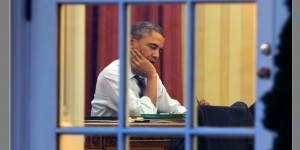UNITED NATIONS — The President’s annual State of the Union address is primarily about domestic policy with foreign flourishes and interludes. Barack Obama, facing lackluster poll ratings, presented a pedantic and populist address with the usual laundry list of political promises.
On the foreign front the speech focused on the draw down of American combat forces from Afghanistan by the end of this year and the earlier pullout from Iraq.
Rhetorically Obama stressed that:
 “Together with our allies, we will complete our mission there by the end of this year, and America’s longest war will finally be over.”
“Together with our allies, we will complete our mission there by the end of this year, and America’s longest war will finally be over.”
And who won? The Taliban militants and Al Qaida terrorists are gaining; the Karzai government in Kabul dithers, and Afghanistan’s future remains clouded. The President was right to say that should the Kabul government agree, “a small force of Americans could remain in Afghanistan with NATO allies to carry out narrow missions,” such as the pursuit of Al Qaida.
He added, “For while our relationship with Afghanistan will change, one thing will not: our resolve that terrorists do not launch attacks against our country.” He conceded, “The fact is that danger remains …. the threat has evolved as Al Qaida affiliates and other extremists take root in different parts of the world. In Yemen, Somalia, Iraq, Mali.” Indeed.
On Syria, the President congratulated himself for the threat to use force (which dangerously divided the international community and the Arab world) but brought an end to Syria’s chemical weapons stockpiles, which are being dismantled under UN auspices, something he failed to acknowledge.
Significantly on the wider Middle East, Obama recommitted himself to “an independent state for Palestinians, and lasting peace and security for the state of Israel, a Jewish state that knows America will always be at their side.”
The Islamic Republic of Iran’s embryonic nuclear program poses a direct threat. Obama credited “American diplomacy, backed by pressure, that has halted the progress of Iran’s nuclear program, and rolled back parts of that program, for the first time in a decade.”
Speaking forcefully, Obama stressed that “negotiations will be difficult; they may not succeed. We are clear eyed about Iran’s support for terrorist organizations like Hizbullah.”
He added, “But these negotiations don’t rely on trust; any long term-deal we agree to must be based on verifiable action.”
But whether this “deal” as it is termed with Islamic Republic of Iran, becomes a truly verifiable agreement is very open to question. Whether the Tehran regime is playing the international community for time to build its nuclear program or whether the rulers really want to come clean remains debatable.
Beyond the political miasma of the Middle East, Obama presented the usual broad brushed statements; “Our alliance with Europe remains the strongest the world has ever known.” And what of the pending Transatlantic Free Trade agreement?
“In Ukraine, we stand for the principle that all people have the right to express themselves freely and peacefully and to have a say in their country’s future.” But where is the magic wand to end this combustible confrontation?
East Asia, the region of the vaunted Pacific pivot got a bare mention. “We will continue to focus on the Asia-Pacific, where we support our allies, shape a future of greater security and prosperity, and extend a hand to those devastated by disaster as we did in the Philippines.”
While aid to the typhoon ravished Philippines was morally justified and greeted locally with words “we will never forget your kindness and God Bless America,” there was no mention of other key concerns such as North Korea’s nuclear weapons program or the threats to our allies South Korea and Japan.
One applause line remark “For the first time in over a decade, business leaders around the world have declared that China is no longer the world’s number one place to invest; America is.” I could not agree more, still the 2013 U.S./China trade statistics show our deficit with Beijing will exceed $300 billion even in a recession year!
And Latin America? Who?
That great continent, neighbor, and business partner was given a short shift sentence in a lengthy speech. The Caribbean was forgotten.
Importantly the address ended with a fitting homage to America’s armed forces, and specifically Army Ranger Cory Remsburg who was terribly injured in Afghan service. Sgt. Remsburg received the loudest and longest appreciative applause of the address. And appropriately so given the U.S. military has done so much to preserve peace and promote security worldwide.
John J. Metzler is a U.N. correspondent covering diplomatic and defense issues. He writes weekly for WorldTribune.com. He is the author of Transatlantic Divide ; USA/Euroland Rift (University Press, 2010).


You must be logged in to post a comment Login